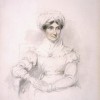
Thomas McLean, “Donation and Collaboration: Joanna Baillie’s A Collection of Poems, Chiefly Manuscript, and From Living Authors, April 1823″
The Scottish poet and playwright Joanna Baillie spent most of 1822 soliciting unpublished or uncollected works from literary acquaintances, including Anna Barbauld, William Wordsworth, and Sir Walter Scott, for a new volume of verse. The purpose of the volume, which appeared in April 1823 as A Collection of Poems, Chiefly Manuscript, and from Living Authors, was to raise funds for a family in financial distress. Relying on Baillie’s letters and new archival research, this essay tells the fuller story of Baillie’s Collection and considers it as an innovative act of literary philanthropy, a precursor to the British annual, and a significant gathering of one strand of Romantic-era poetry. An amended table of contents identifies some of the anonymous and lesser-known contributors.

Katherine D. Harris, “The Legacy of Rudolph Ackermann and Nineteenth-Century British Literary Annuals”
By November 1822, the British reading public had already voraciously consumed both Walter Scott’s expensive novels and Rudolf Ackermann’s exquisite lithographs. The next decade, referred to by some scholars as dormant and unproductive, is in fact bursting with Forget Me Nots, Friendship’s Offerings, Keepsakes, and Literary Souvenirs. By wrapping literature, poetry, and art into an alluring package, editors and publishers saturated the market with a new, popular, and best-selling genre, the literary annual. In this excerpt from the introduction to Forget Me Not: The Rise of the British Literary Annual, the foundations of the literary annual, its Poetess Tradition, its varied and sometimes canonical authors are introduced in conjunction with the formative print culture and history of early nineteenth-century Britain.
